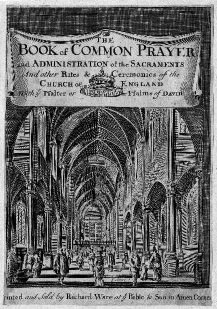“The Uncommon Prayer-Book” is a horror story by the English medievalist and author M. R. James (1862–1936), first published in A Warning to the Curious and Other Ghost StoriesCollection of six short stories by the English medievalist and author M. R. James, first published in 1925. (1925).[1]
The story concerns the theft of a number of prayer-books that have been repeatedly found to be open at a particular psalm, despite being kept in a locked and disused church. It is told as a third-person narrative.
Synopsis
Finding himself alone during the first week of January, Mr Davidson decides to spend some time at the Swan Hotel in Longbridge. On the third day of his visit, he takes the train a couple of stations westwards to Kingsbourne Junction, intending to then walk back along the Tent valley through a couple of picturesque villlages. Davidson gets into conversation with the only other occupant of his carriage, Mr Avery, an old man who says he is also travelling to Kingsbourne, to visit his daughter who lives at nearby Brockstone, a now abandoned village.
Avery explains that his daughter is the wife of the keeper of Brockstone Court, which has a disused chapel. Davidson expresses an interest in seeing the chapel, and the old man tells him that his daughter, Mary Porter, would be delighted to show him around.
Davidson is pleasantly surprised at the chapel’s completeness and rich decoration, but under the dust cloths over the cushions in the stalls where the family once sat, are eight prayer-books, all open at the same page, Psalm 109. Mary tells Davidson that she has the only key to the chapel, and that every time she visits she closes the books and covers them, but each time when she returns they are open again, at Psalm 109, at the head of which has been added a note, “For the 25th day of April”. On examining the books, Davidson discovers that they are dated 1653, making them a “very odd and wholly unauthorized version” of the Book of Common Prayer,[a]The official liturgy of the Church of England. printed “when the use of the book, let alone the printing of it, was penal”.[b]Following the English Civil War, the parliament of Oliver Cromwell introduced a new Directory of Public Worship in 1645 as a replacement for the Book of Common Prayer,[2] which was not reinstated until 1662.[3]
While travelling home by train the following day Davidson recollects that 25 April is St Mark’s Day, and the date of Oliver Cromwell’s birth in 1599. He decides to return to the chapel at Brockstone on that date to see if anything exceptional occurs. Mary Porter remembers him, and is quite happy to show Davidson and his companion round. When examining the prayer-books they find them all closed, not open as they had expected, but on closer inspection Davidson discovers they are not the books he had seen on his first visit.
Mary tells Davidson of a gentleman who had visited earlier in the year to take some photographs of the chapel interior, and supposes that it must have he who switched the books when he was left alone for a time.
The story ends with the account of an interview between two police officers and the commissionaire of an office in London; the police are investigating the death of a dealer in old books, Mr Poschwitz. The commissionaire tells them that Poschwitz had asked him to remain past his usual leaving time, but as the afternoon wore on he became impatient to be off, and went up to Poschwitz’s office. Through the glass door he saw Poschwitz open the safe, and as he was lifting a package off the floor of the safe something that resembled a “great roll of old shabby white flannel, about four to five feet high”, fell forward against Poschwitz, and as it did so the commissionaire saw that it had a face. The bundle then appeared to bite Poschwitz on the neck, killing him almost instantaneously according to the police surgeon.
Initially a snake is suspected, but none is found. The room, however, is covered in dust. On examination the package Poschwitz was removing from the safe is found to contain old Prayer-Books, undoubtedly those stolen from the chapel at Brockstone.
See also
- M. R. James bibliographyList of the works written by M. R. James.
Notes
References
Bibliography
External links
- Full text of A Warning to the Curious and Other Ghost Stories at Project Gutenberg

